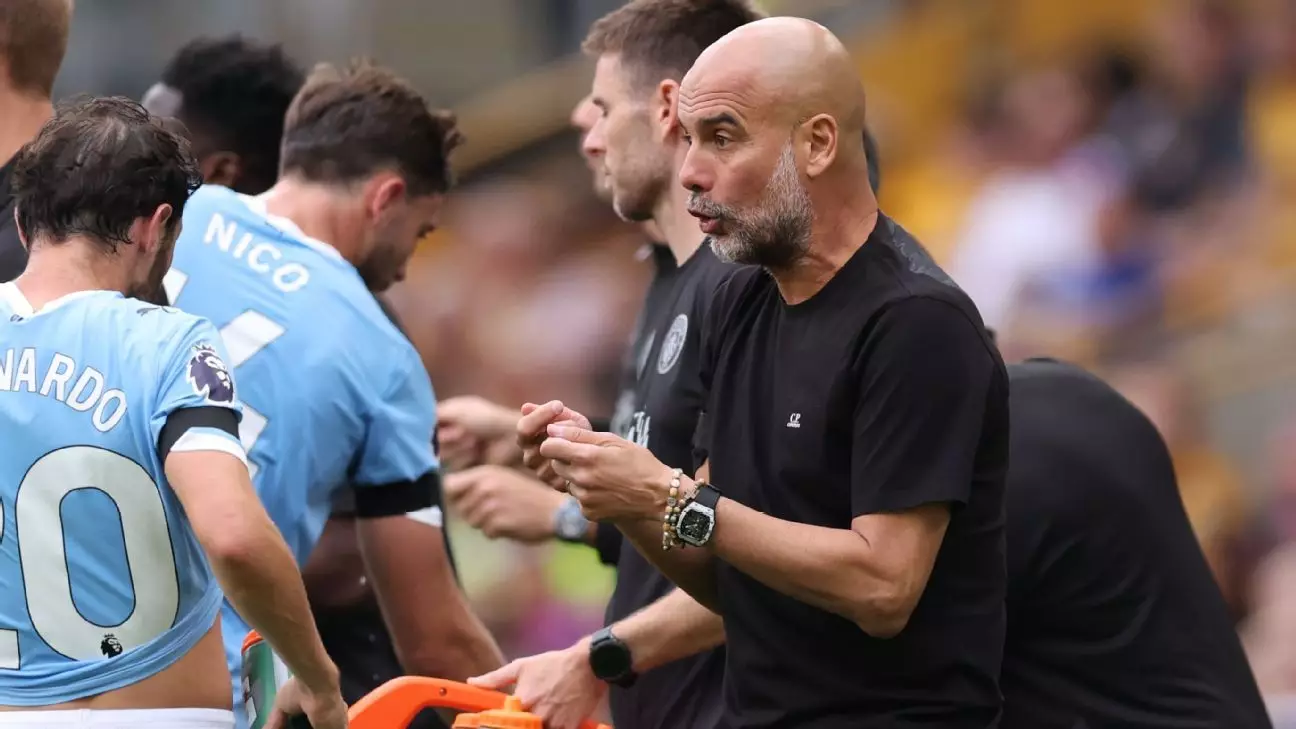Manchester City’s commanding 4-0 victory over Wolves in their season opener undoubtedly sparks positivity, yet beneath the surface lies a complex and tense reality. Head coach Pep Guardiola’s praise is tinged with a gnawing concern about the size and morale of his squad. While the stunning debut of new signings like Tijjani Reijnders and Rayan Cherki hints at tactical depth, Guardiola’s candid criticism about the team’s squad health reveals a deeper vulnerability that could threaten future stability. His remark about the squad being “not healthy” underpins a challenge that many top clubs face in balancing competitive needs with squad harmony. The enthusiasm from the opening day may be somewhat artificial if internal discord about player management and morale festers unchecked.
The manager’s emphasis on avoiding an overstuffed roster exposes a strategic balancing act—one that influences not only team dynamics but also the chemistry among players. The prolonged debate about offloading excess players suggests that City’s squad, though seemingly well-stocked, might have more baggage than strategic advantage. This paradox—having enough players to compete at the highest level but not so many that it hampers team cohesion—is a reflection of modern football’s logistical dilemmas. Guardiola’s insistence that no player should be left at home highlights his desire for inclusivity and fairness, but it also raises questions about whether the current squad composition fosters the best environment for performance or breeds friction.
Behind the Curtains of Goalkeeper Uncertainty
One of the most compelling off-the-field stories is the situation surrounding Ederson, City’s trusted custodian. Despite consistent performances, speculation about his future continues to swirl, driven in part by rumors linking City with Gianluigi Donnarumma and ongoing interest from clubs like Galatasaray. Guardiola’s assertion that Ederson remains his “number one” suggests a preference for stability, yet the fact that his status is open to question underlines underlying concerns over squad depth and future planning.
Guardiola’s statements about Ederson’s illness and the club’s decision-making process reveal an often unseen side of managing a top-tier team — the balancing act between honoring a player’s reputation and preparing for inevitable squad changes. The manager’s emphasis that any departure would depend on club conditions reflects a pragmatic approach, but it leaves unresolved questions about how City plans to maintain its competitive edge if their most reliable goalkeeper becomes a transfer focal point. This uncertainty may subtly influence team morale, especially if players begin to question the longevity of their roles within the squad.
Strategic Tensions and the Quest for Long-Term Stability
The squad building process remains the central theme of City’s ongoing challenges. Guardiola’s desire to maintain a deep, versatile roster is tempered by the realities of player contracts, burgeoning transfer rumors, and the necessity to offload surplus talent. The transfer window’s coming weeks will be critical as City navigates these turbulent waters. The departure of Morgan Whittaker, now heading to Nottingham Forest for £30 million, exemplifies the club’s ongoing efforts to streamline.
More broadly, Guardiola’s statements reveal a philosophical tension: how to develop a squad capable of competing persistently without succumbing to internal discontent or logistical chaos. His remarks about individual player happiness and club control over departures suggest an awareness that long-term stability hinges not just on tactical prowess but also on managing player relationships and expectations. Furthermore, there exists a palpable undercurrent of strategic patience—City is evidently trying to strike a balance between immediate success and the sustainable growth necessary to sustain their dominance in English football.
This contemplation extends beyond squad size into the very ethos of modern football management—where the fine line between ambition and chaos is often navigated with ruthless precision. Guardiola’s openness about the challenges signals a leader aware that the road ahead demands not just tactical brilliance but astute human resource management. The coming weeks will test whether Manchester City can reconcile these internal struggles with their relentless pursuit of excellence and consistency.
In essence, behind Manchester City’s blockbuster start lies a tapestry of unspoken challenges—squad health, internal harmony, and strategic foresight—that could determine whether their current dominance is merely a fleeting victory or the prelude to a lasting legacy.

